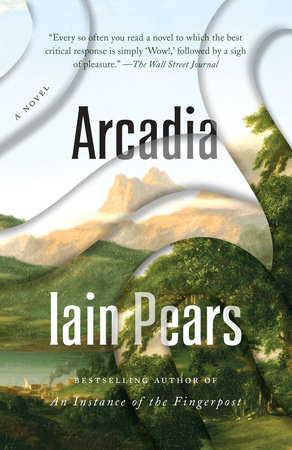Reading Group Center
- Home •
- Books by Category •
- Imprints •
- News •
- Videos •
- Media Center •
- Reading Group Center
Iain Pears on Arcadia: An Exclusive Q&A
Iain Pears is the internationally bestselling author of An Instance of the Finger Post, and in his latest, Arcadia, he has once again written a thrilling work of historical fiction. But the fascinating twist of Arcadia is that it’s also a spy novel. And dystopian fiction. And about time travel. And a Tolkien-like fantasy. This book truly has everything, and we’re absolutely certain you’ll enjoy each page. We got the chance to ask Pears a few questions about this epic work to celebrate the paperback publication. Read on to discover the authors that influenced Arcadia and the best writing advice Iain Pears has received.
Reading Group Center: How would you describe Arcadia in twenty-five words or fewer?
Iain Pears: An early reviewer described it as an “entertaining Shakespearean time-travel dystopian science fantasy spy thriller romance.” I think he nailed it in ten words quite well.
RGC: This book weaves together several distinct plots and settings, (Oxford in 1960, a pastoral fantasy world, and a dystopian future) that connect in different ways. Did you have everything worked out before you began writing? How did you keep track of it all?
IP: I had nothing worked out at all as far as the story goes; I can never plan in advance. I did have a general structure in my mind though—that is, interconnections between three different worlds, paralleled by different genres of fiction. Keeping control of it was done through a specially written software program which allowed me to visualize the ten major character lines and their interactions.
RGC: Arcadia is rich with fascinating characters: Jay, Rosie, Henry Lytten, and Angela all jump off the page. Did you have a favorite character to write? Were any of their voices more of a challenge than the others?
IP: Probably Angela Meerson, the scientist. I have always had a weak spot for slightly eccentric and strong-willed characters, and find writing in the first person particularly pleasurable.
RGC: In the novel, Professor Lytten is inspired by the magical worlds of J. R. R. Tolkien and C. S. Lewis. Did these authors influence your writing? How?
IP: And many others as well—the book is a result of all the old novels and other books Lytten has read in his life, which means pretty much in mine as well.
RGC: Lytten (inadvertently) creates a fantasy world in his own basement. If you could have your own basement fantasy world, what would it look like?
IP: I live in the center of England, and it is winter. So my fantasy world would be warm, sunny, by the sea, nearly empty, and full of decent restaurants. Some mountains would be pleasant, as well.
RGC: In the fantasy world in Lytten’s basement, Storytellers are the most respected members of society. Do you think the real world could benefit from official storytellers?
IP: Probably not; the nearest the real world has come has been priests of various sorts, and their period of great influence was always a mixed blessing.
RGC: What is the best writing advice you’ve ever received? What about reading advice?
IP: Writing: “Always remember noone has to read your book.” That is, you have to work hard to earn the reader’s attention.
Reading: “Never blame an author for not writing the book you would have written in their place.”
RGC: Imagine you’re part of a book club discussing Arcadia. What is a topic or question you’d like to pose to the group?
IP: Do you want me to write volume two?


